Developing Manager Report: Skills, Culture, and Development Plan
VerifiedAdded on 2020/06/04
|18
|5605
|92
Report
AI Summary
This report, focused on the development of a manager, delves into various management styles including autocratic, consultative, persuasive, democratic, chaotic, laissez-faire, management by walking around, and Asian paternalistic approaches. It highlights essential leadership characteristics such as confidence, focus, honesty, positivity, decisiveness, and the ability to inspire. The report also evaluates the communication process, outlining the roles of the sender, encoding, message, communication channel, receiver, decoding, and feedback, using the British Hospitality Association (BHA) as a case study. Furthermore, it analyzes organizational culture, emphasizing the creative culture of BHA, its core values, and its operational schedule. Finally, the report addresses personal development, career needs, and the creation of a development plan, offering insights into how managerial and personal skills support career advancement.
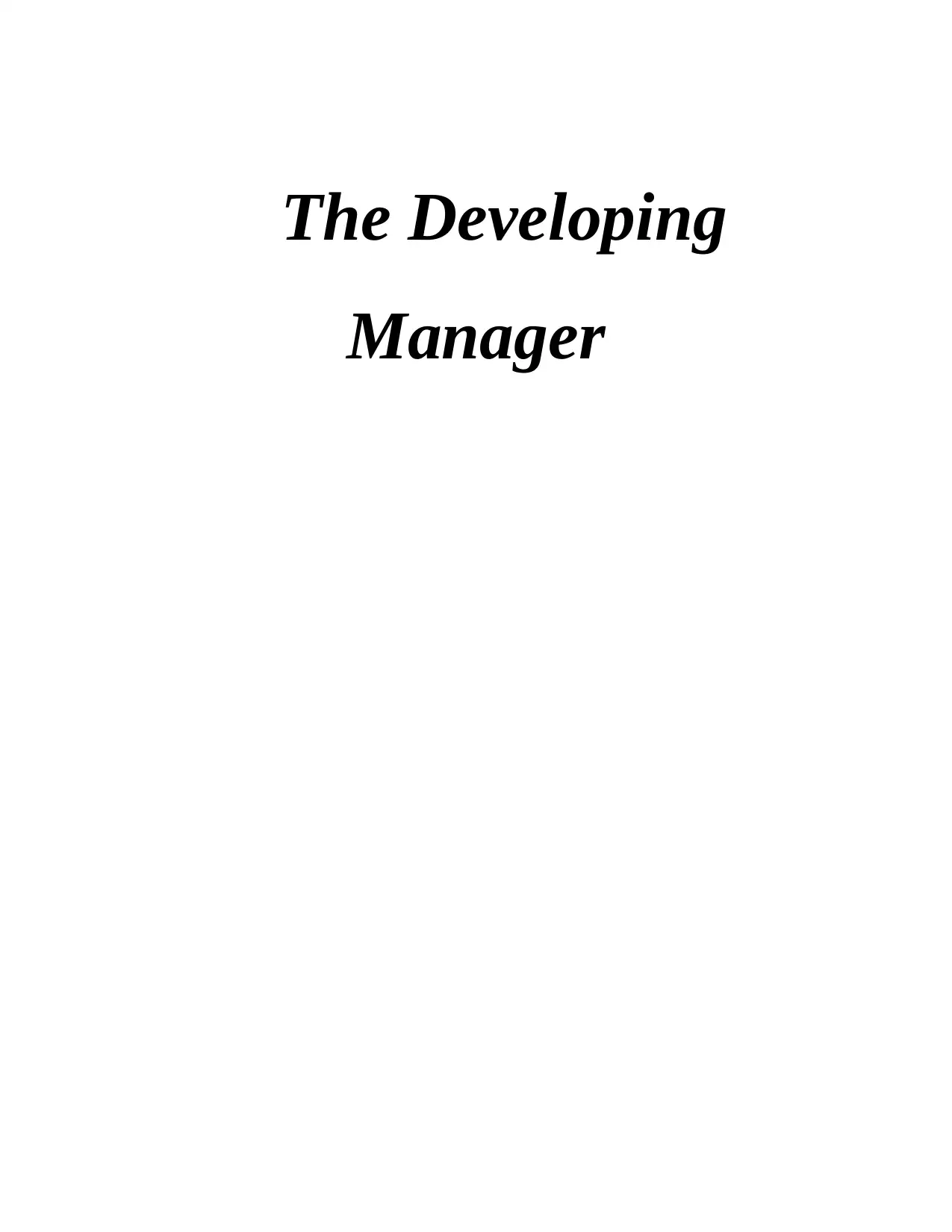
The Developing
Manager
Manager
Paraphrase This Document
Need a fresh take? Get an instant paraphrase of this document with our AI Paraphraser
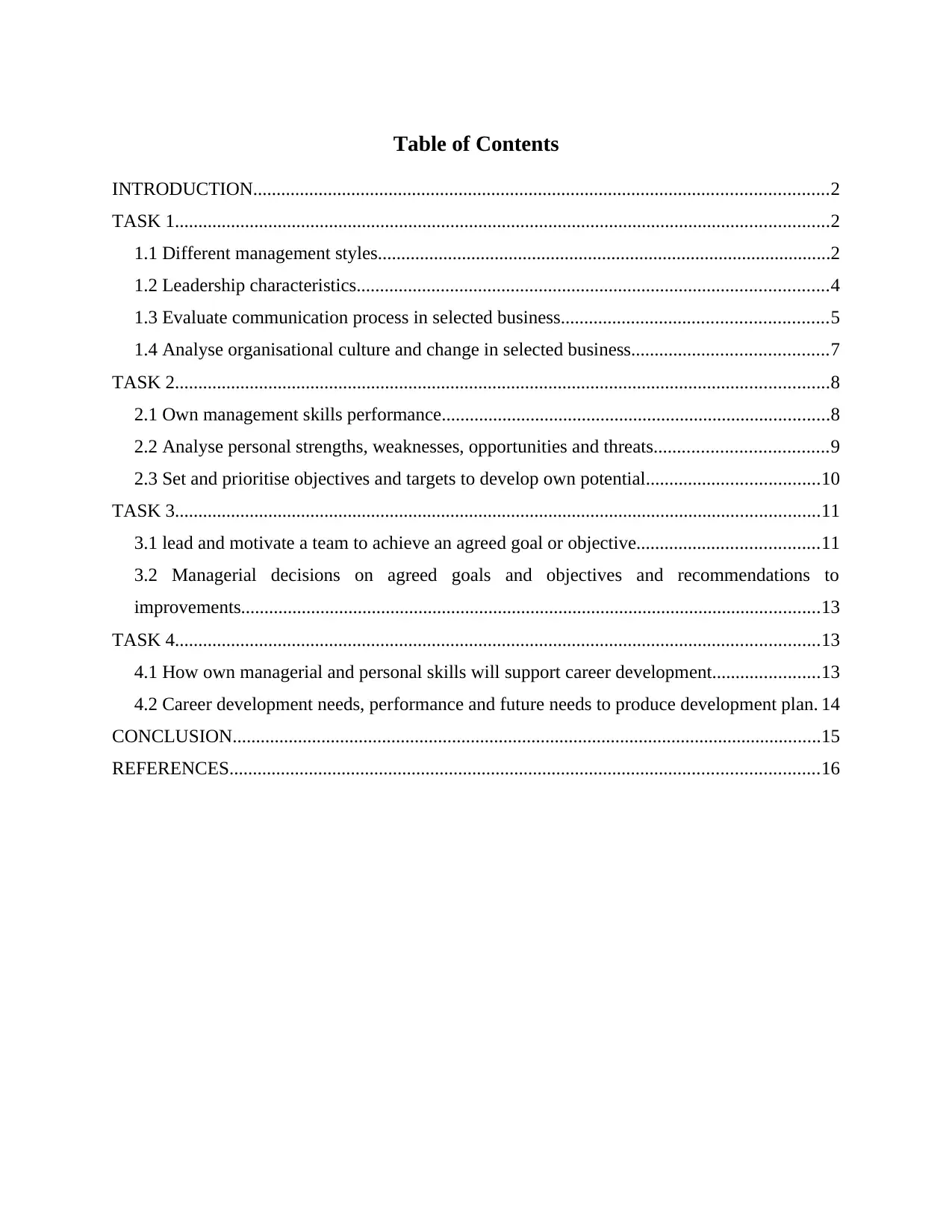
Table of Contents
INTRODUCTION...........................................................................................................................2
TASK 1............................................................................................................................................2
1.1 Different management styles.................................................................................................2
1.2 Leadership characteristics.....................................................................................................4
1.3 Evaluate communication process in selected business.........................................................5
1.4 Analyse organisational culture and change in selected business..........................................7
TASK 2............................................................................................................................................8
2.1 Own management skills performance...................................................................................8
2.2 Analyse personal strengths, weaknesses, opportunities and threats.....................................9
2.3 Set and prioritise objectives and targets to develop own potential.....................................10
TASK 3..........................................................................................................................................11
3.1 lead and motivate a team to achieve an agreed goal or objective.......................................11
3.2 Managerial decisions on agreed goals and objectives and recommendations to
improvements............................................................................................................................13
TASK 4..........................................................................................................................................13
4.1 How own managerial and personal skills will support career development.......................13
4.2 Career development needs, performance and future needs to produce development plan. 14
CONCLUSION..............................................................................................................................15
REFERENCES..............................................................................................................................16
INTRODUCTION...........................................................................................................................2
TASK 1............................................................................................................................................2
1.1 Different management styles.................................................................................................2
1.2 Leadership characteristics.....................................................................................................4
1.3 Evaluate communication process in selected business.........................................................5
1.4 Analyse organisational culture and change in selected business..........................................7
TASK 2............................................................................................................................................8
2.1 Own management skills performance...................................................................................8
2.2 Analyse personal strengths, weaknesses, opportunities and threats.....................................9
2.3 Set and prioritise objectives and targets to develop own potential.....................................10
TASK 3..........................................................................................................................................11
3.1 lead and motivate a team to achieve an agreed goal or objective.......................................11
3.2 Managerial decisions on agreed goals and objectives and recommendations to
improvements............................................................................................................................13
TASK 4..........................................................................................................................................13
4.1 How own managerial and personal skills will support career development.......................13
4.2 Career development needs, performance and future needs to produce development plan. 14
CONCLUSION..............................................................................................................................15
REFERENCES..............................................................................................................................16
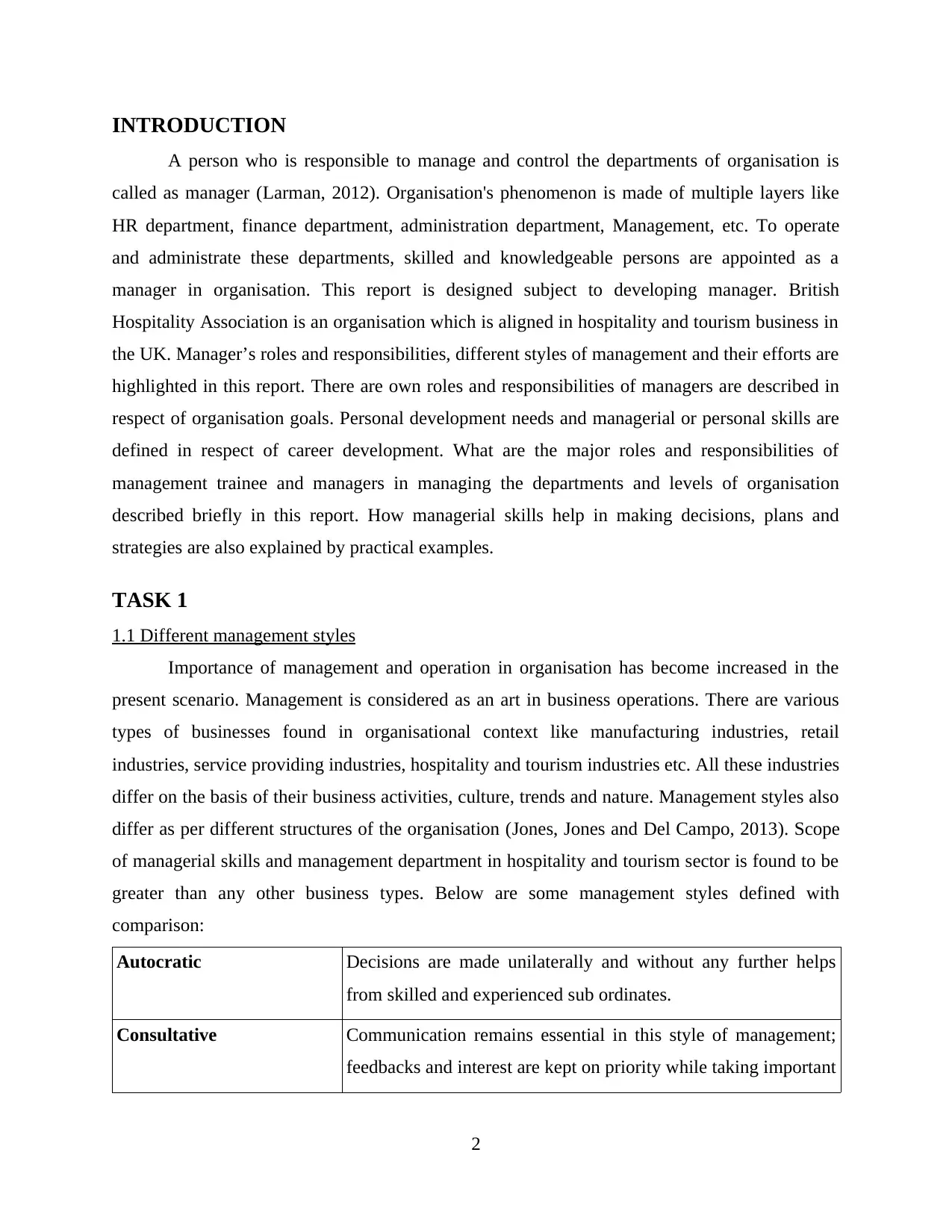
INTRODUCTION
A person who is responsible to manage and control the departments of organisation is
called as manager (Larman, 2012). Organisation's phenomenon is made of multiple layers like
HR department, finance department, administration department, Management, etc. To operate
and administrate these departments, skilled and knowledgeable persons are appointed as a
manager in organisation. This report is designed subject to developing manager. British
Hospitality Association is an organisation which is aligned in hospitality and tourism business in
the UK. Manager’s roles and responsibilities, different styles of management and their efforts are
highlighted in this report. There are own roles and responsibilities of managers are described in
respect of organisation goals. Personal development needs and managerial or personal skills are
defined in respect of career development. What are the major roles and responsibilities of
management trainee and managers in managing the departments and levels of organisation
described briefly in this report. How managerial skills help in making decisions, plans and
strategies are also explained by practical examples.
TASK 1
1.1 Different management styles
Importance of management and operation in organisation has become increased in the
present scenario. Management is considered as an art in business operations. There are various
types of businesses found in organisational context like manufacturing industries, retail
industries, service providing industries, hospitality and tourism industries etc. All these industries
differ on the basis of their business activities, culture, trends and nature. Management styles also
differ as per different structures of the organisation (Jones, Jones and Del Campo, 2013). Scope
of managerial skills and management department in hospitality and tourism sector is found to be
greater than any other business types. Below are some management styles defined with
comparison:
Autocratic Decisions are made unilaterally and without any further helps
from skilled and experienced sub ordinates.
Consultative Communication remains essential in this style of management;
feedbacks and interest are kept on priority while taking important
2
A person who is responsible to manage and control the departments of organisation is
called as manager (Larman, 2012). Organisation's phenomenon is made of multiple layers like
HR department, finance department, administration department, Management, etc. To operate
and administrate these departments, skilled and knowledgeable persons are appointed as a
manager in organisation. This report is designed subject to developing manager. British
Hospitality Association is an organisation which is aligned in hospitality and tourism business in
the UK. Manager’s roles and responsibilities, different styles of management and their efforts are
highlighted in this report. There are own roles and responsibilities of managers are described in
respect of organisation goals. Personal development needs and managerial or personal skills are
defined in respect of career development. What are the major roles and responsibilities of
management trainee and managers in managing the departments and levels of organisation
described briefly in this report. How managerial skills help in making decisions, plans and
strategies are also explained by practical examples.
TASK 1
1.1 Different management styles
Importance of management and operation in organisation has become increased in the
present scenario. Management is considered as an art in business operations. There are various
types of businesses found in organisational context like manufacturing industries, retail
industries, service providing industries, hospitality and tourism industries etc. All these industries
differ on the basis of their business activities, culture, trends and nature. Management styles also
differ as per different structures of the organisation (Jones, Jones and Del Campo, 2013). Scope
of managerial skills and management department in hospitality and tourism sector is found to be
greater than any other business types. Below are some management styles defined with
comparison:
Autocratic Decisions are made unilaterally and without any further helps
from skilled and experienced sub ordinates.
Consultative Communication remains essential in this style of management;
feedbacks and interest are kept on priority while taking important
2
⊘ This is a preview!⊘
Do you want full access?
Subscribe today to unlock all pages.

Trusted by 1+ million students worldwide
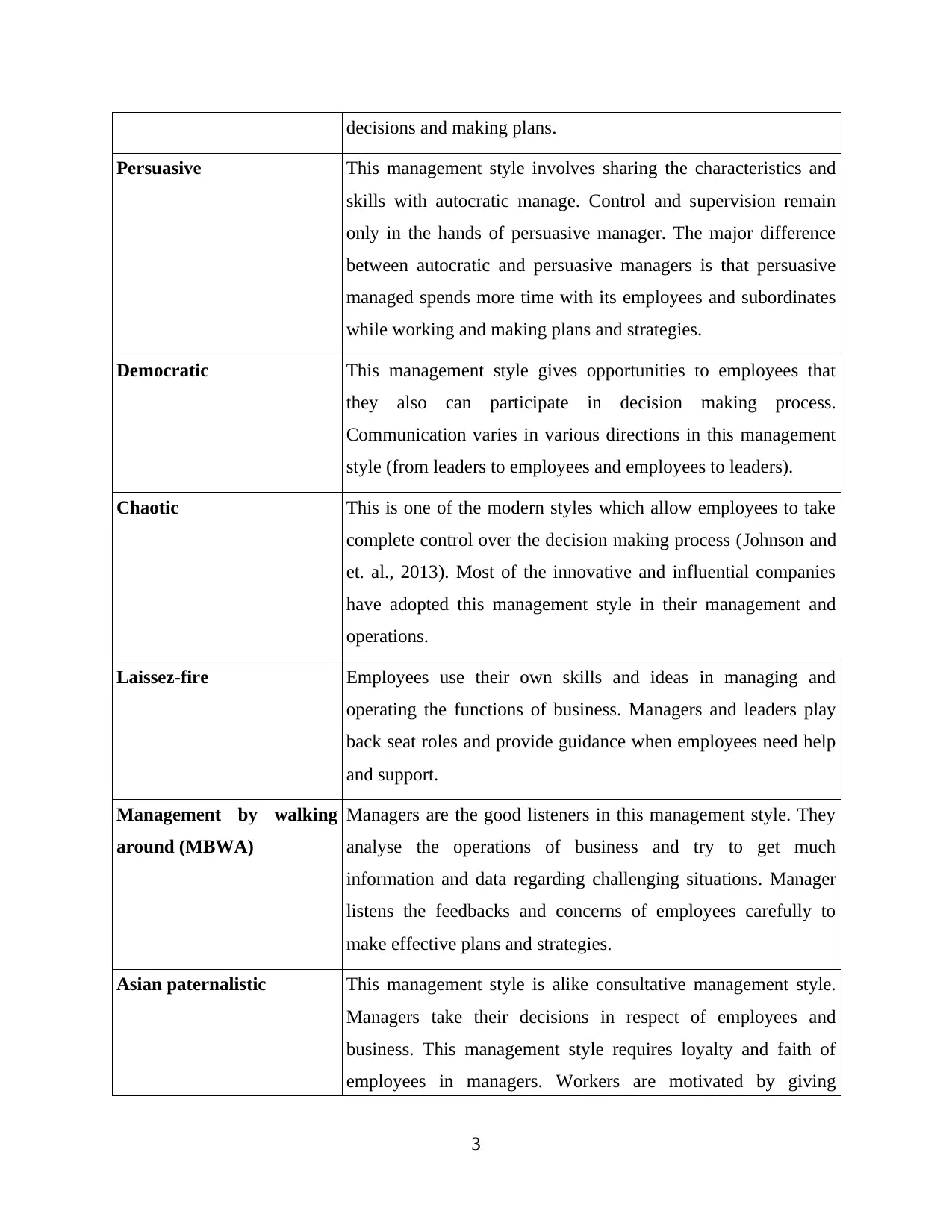
decisions and making plans.
Persuasive This management style involves sharing the characteristics and
skills with autocratic manage. Control and supervision remain
only in the hands of persuasive manager. The major difference
between autocratic and persuasive managers is that persuasive
managed spends more time with its employees and subordinates
while working and making plans and strategies.
Democratic This management style gives opportunities to employees that
they also can participate in decision making process.
Communication varies in various directions in this management
style (from leaders to employees and employees to leaders).
Chaotic This is one of the modern styles which allow employees to take
complete control over the decision making process (Johnson and
et. al., 2013). Most of the innovative and influential companies
have adopted this management style in their management and
operations.
Laissez-fire Employees use their own skills and ideas in managing and
operating the functions of business. Managers and leaders play
back seat roles and provide guidance when employees need help
and support.
Management by walking
around (MBWA)
Managers are the good listeners in this management style. They
analyse the operations of business and try to get much
information and data regarding challenging situations. Manager
listens the feedbacks and concerns of employees carefully to
make effective plans and strategies.
Asian paternalistic This management style is alike consultative management style.
Managers take their decisions in respect of employees and
business. This management style requires loyalty and faith of
employees in managers. Workers are motivated by giving
3
Persuasive This management style involves sharing the characteristics and
skills with autocratic manage. Control and supervision remain
only in the hands of persuasive manager. The major difference
between autocratic and persuasive managers is that persuasive
managed spends more time with its employees and subordinates
while working and making plans and strategies.
Democratic This management style gives opportunities to employees that
they also can participate in decision making process.
Communication varies in various directions in this management
style (from leaders to employees and employees to leaders).
Chaotic This is one of the modern styles which allow employees to take
complete control over the decision making process (Johnson and
et. al., 2013). Most of the innovative and influential companies
have adopted this management style in their management and
operations.
Laissez-fire Employees use their own skills and ideas in managing and
operating the functions of business. Managers and leaders play
back seat roles and provide guidance when employees need help
and support.
Management by walking
around (MBWA)
Managers are the good listeners in this management style. They
analyse the operations of business and try to get much
information and data regarding challenging situations. Manager
listens the feedbacks and concerns of employees carefully to
make effective plans and strategies.
Asian paternalistic This management style is alike consultative management style.
Managers take their decisions in respect of employees and
business. This management style requires loyalty and faith of
employees in managers. Workers are motivated by giving
3
Paraphrase This Document
Need a fresh take? Get an instant paraphrase of this document with our AI Paraphraser
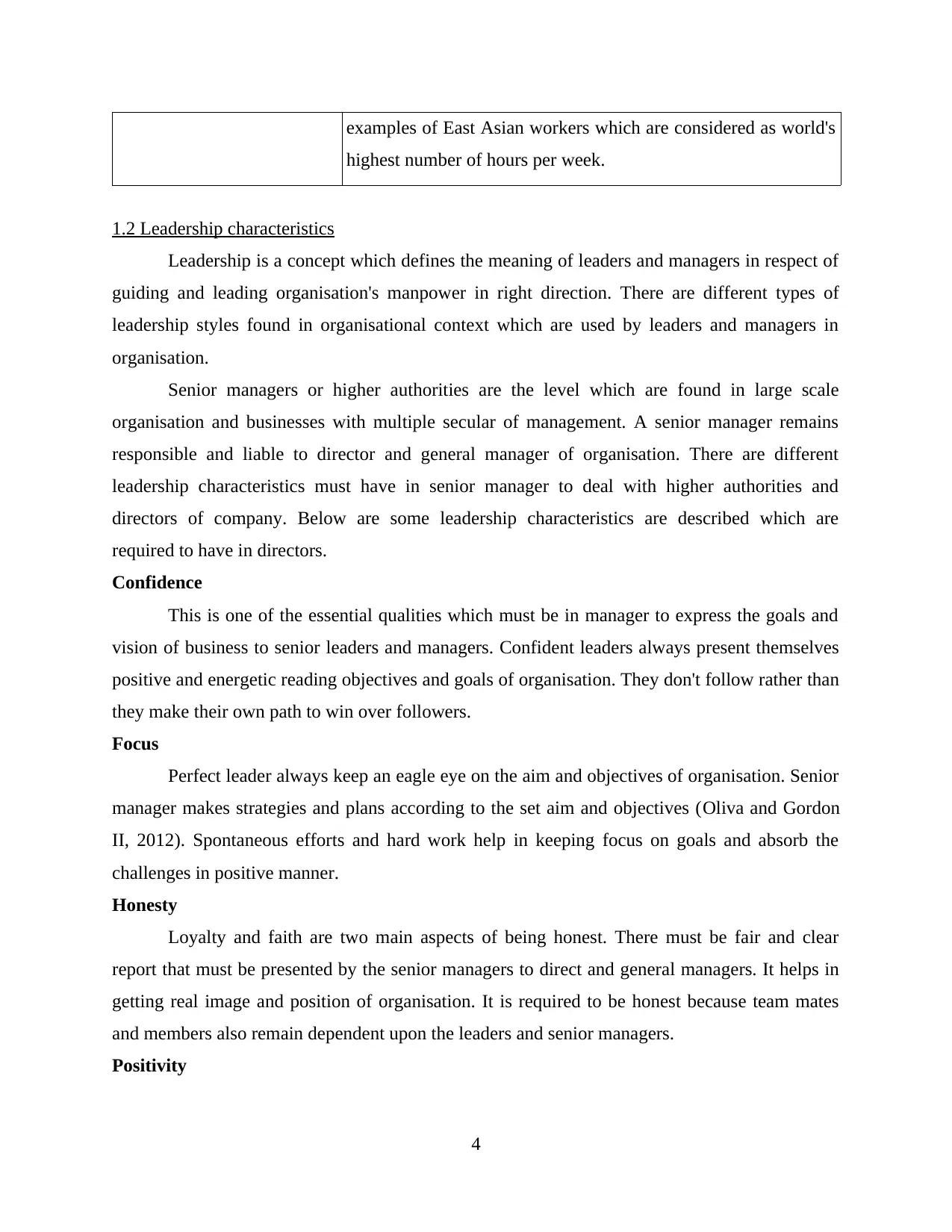
examples of East Asian workers which are considered as world's
highest number of hours per week.
1.2 Leadership characteristics
Leadership is a concept which defines the meaning of leaders and managers in respect of
guiding and leading organisation's manpower in right direction. There are different types of
leadership styles found in organisational context which are used by leaders and managers in
organisation.
Senior managers or higher authorities are the level which are found in large scale
organisation and businesses with multiple secular of management. A senior manager remains
responsible and liable to director and general manager of organisation. There are different
leadership characteristics must have in senior manager to deal with higher authorities and
directors of company. Below are some leadership characteristics are described which are
required to have in directors.
Confidence
This is one of the essential qualities which must be in manager to express the goals and
vision of business to senior leaders and managers. Confident leaders always present themselves
positive and energetic reading objectives and goals of organisation. They don't follow rather than
they make their own path to win over followers.
Focus
Perfect leader always keep an eagle eye on the aim and objectives of organisation. Senior
manager makes strategies and plans according to the set aim and objectives (Oliva and Gordon
II, 2012). Spontaneous efforts and hard work help in keeping focus on goals and absorb the
challenges in positive manner.
Honesty
Loyalty and faith are two main aspects of being honest. There must be fair and clear
report that must be presented by the senior managers to direct and general managers. It helps in
getting real image and position of organisation. It is required to be honest because team mates
and members also remain dependent upon the leaders and senior managers.
Positivity
4
highest number of hours per week.
1.2 Leadership characteristics
Leadership is a concept which defines the meaning of leaders and managers in respect of
guiding and leading organisation's manpower in right direction. There are different types of
leadership styles found in organisational context which are used by leaders and managers in
organisation.
Senior managers or higher authorities are the level which are found in large scale
organisation and businesses with multiple secular of management. A senior manager remains
responsible and liable to director and general manager of organisation. There are different
leadership characteristics must have in senior manager to deal with higher authorities and
directors of company. Below are some leadership characteristics are described which are
required to have in directors.
Confidence
This is one of the essential qualities which must be in manager to express the goals and
vision of business to senior leaders and managers. Confident leaders always present themselves
positive and energetic reading objectives and goals of organisation. They don't follow rather than
they make their own path to win over followers.
Focus
Perfect leader always keep an eagle eye on the aim and objectives of organisation. Senior
manager makes strategies and plans according to the set aim and objectives (Oliva and Gordon
II, 2012). Spontaneous efforts and hard work help in keeping focus on goals and absorb the
challenges in positive manner.
Honesty
Loyalty and faith are two main aspects of being honest. There must be fair and clear
report that must be presented by the senior managers to direct and general managers. It helps in
getting real image and position of organisation. It is required to be honest because team mates
and members also remain dependent upon the leaders and senior managers.
Positivity
4
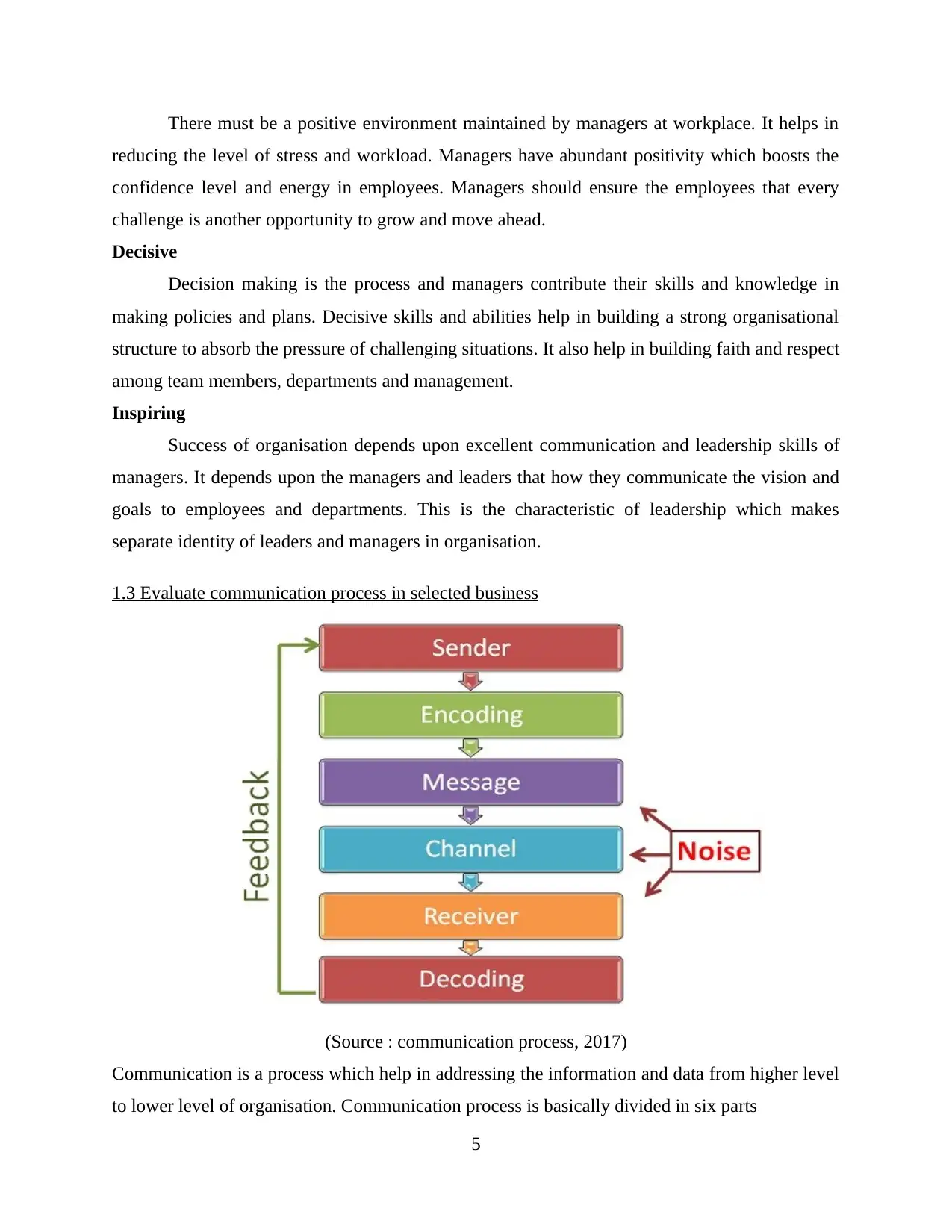
There must be a positive environment maintained by managers at workplace. It helps in
reducing the level of stress and workload. Managers have abundant positivity which boosts the
confidence level and energy in employees. Managers should ensure the employees that every
challenge is another opportunity to grow and move ahead.
Decisive
Decision making is the process and managers contribute their skills and knowledge in
making policies and plans. Decisive skills and abilities help in building a strong organisational
structure to absorb the pressure of challenging situations. It also help in building faith and respect
among team members, departments and management.
Inspiring
Success of organisation depends upon excellent communication and leadership skills of
managers. It depends upon the managers and leaders that how they communicate the vision and
goals to employees and departments. This is the characteristic of leadership which makes
separate identity of leaders and managers in organisation.
1.3 Evaluate communication process in selected business
(Source : communication process, 2017)
Communication is a process which help in addressing the information and data from higher level
to lower level of organisation. Communication process is basically divided in six parts
5
reducing the level of stress and workload. Managers have abundant positivity which boosts the
confidence level and energy in employees. Managers should ensure the employees that every
challenge is another opportunity to grow and move ahead.
Decisive
Decision making is the process and managers contribute their skills and knowledge in
making policies and plans. Decisive skills and abilities help in building a strong organisational
structure to absorb the pressure of challenging situations. It also help in building faith and respect
among team members, departments and management.
Inspiring
Success of organisation depends upon excellent communication and leadership skills of
managers. It depends upon the managers and leaders that how they communicate the vision and
goals to employees and departments. This is the characteristic of leadership which makes
separate identity of leaders and managers in organisation.
1.3 Evaluate communication process in selected business
(Source : communication process, 2017)
Communication is a process which help in addressing the information and data from higher level
to lower level of organisation. Communication process is basically divided in six parts
5
⊘ This is a preview!⊘
Do you want full access?
Subscribe today to unlock all pages.

Trusted by 1+ million students worldwide
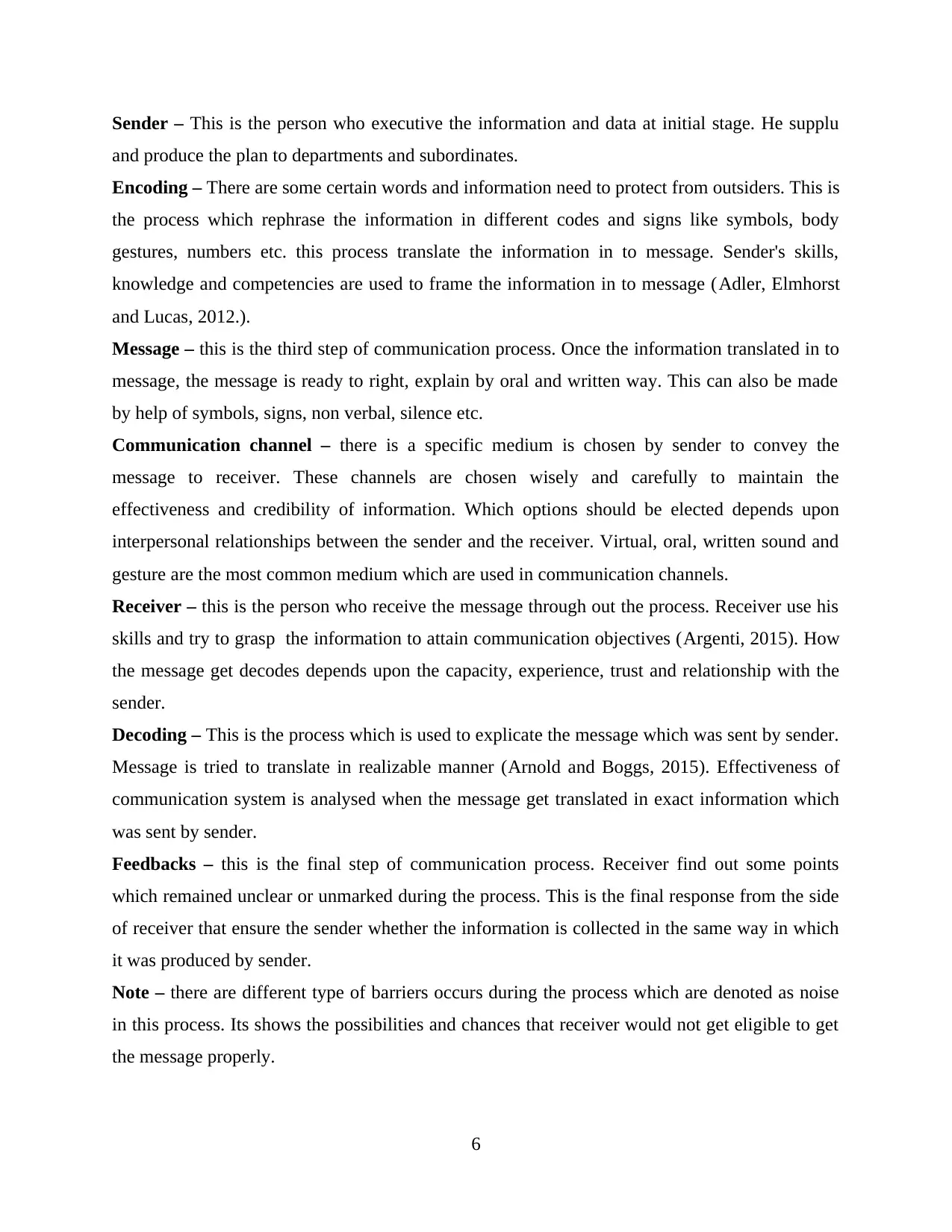
Sender – This is the person who executive the information and data at initial stage. He supplu
and produce the plan to departments and subordinates.
Encoding – There are some certain words and information need to protect from outsiders. This is
the process which rephrase the information in different codes and signs like symbols, body
gestures, numbers etc. this process translate the information in to message. Sender's skills,
knowledge and competencies are used to frame the information in to message (Adler, Elmhorst
and Lucas, 2012.).
Message – this is the third step of communication process. Once the information translated in to
message, the message is ready to right, explain by oral and written way. This can also be made
by help of symbols, signs, non verbal, silence etc.
Communication channel – there is a specific medium is chosen by sender to convey the
message to receiver. These channels are chosen wisely and carefully to maintain the
effectiveness and credibility of information. Which options should be elected depends upon
interpersonal relationships between the sender and the receiver. Virtual, oral, written sound and
gesture are the most common medium which are used in communication channels.
Receiver – this is the person who receive the message through out the process. Receiver use his
skills and try to grasp the information to attain communication objectives (Argenti, 2015). How
the message get decodes depends upon the capacity, experience, trust and relationship with the
sender.
Decoding – This is the process which is used to explicate the message which was sent by sender.
Message is tried to translate in realizable manner (Arnold and Boggs, 2015). Effectiveness of
communication system is analysed when the message get translated in exact information which
was sent by sender.
Feedbacks – this is the final step of communication process. Receiver find out some points
which remained unclear or unmarked during the process. This is the final response from the side
of receiver that ensure the sender whether the information is collected in the same way in which
it was produced by sender.
Note – there are different type of barriers occurs during the process which are denoted as noise
in this process. Its shows the possibilities and chances that receiver would not get eligible to get
the message properly.
6
and produce the plan to departments and subordinates.
Encoding – There are some certain words and information need to protect from outsiders. This is
the process which rephrase the information in different codes and signs like symbols, body
gestures, numbers etc. this process translate the information in to message. Sender's skills,
knowledge and competencies are used to frame the information in to message (Adler, Elmhorst
and Lucas, 2012.).
Message – this is the third step of communication process. Once the information translated in to
message, the message is ready to right, explain by oral and written way. This can also be made
by help of symbols, signs, non verbal, silence etc.
Communication channel – there is a specific medium is chosen by sender to convey the
message to receiver. These channels are chosen wisely and carefully to maintain the
effectiveness and credibility of information. Which options should be elected depends upon
interpersonal relationships between the sender and the receiver. Virtual, oral, written sound and
gesture are the most common medium which are used in communication channels.
Receiver – this is the person who receive the message through out the process. Receiver use his
skills and try to grasp the information to attain communication objectives (Argenti, 2015). How
the message get decodes depends upon the capacity, experience, trust and relationship with the
sender.
Decoding – This is the process which is used to explicate the message which was sent by sender.
Message is tried to translate in realizable manner (Arnold and Boggs, 2015). Effectiveness of
communication system is analysed when the message get translated in exact information which
was sent by sender.
Feedbacks – this is the final step of communication process. Receiver find out some points
which remained unclear or unmarked during the process. This is the final response from the side
of receiver that ensure the sender whether the information is collected in the same way in which
it was produced by sender.
Note – there are different type of barriers occurs during the process which are denoted as noise
in this process. Its shows the possibilities and chances that receiver would not get eligible to get
the message properly.
6
Paraphrase This Document
Need a fresh take? Get an instant paraphrase of this document with our AI Paraphraser
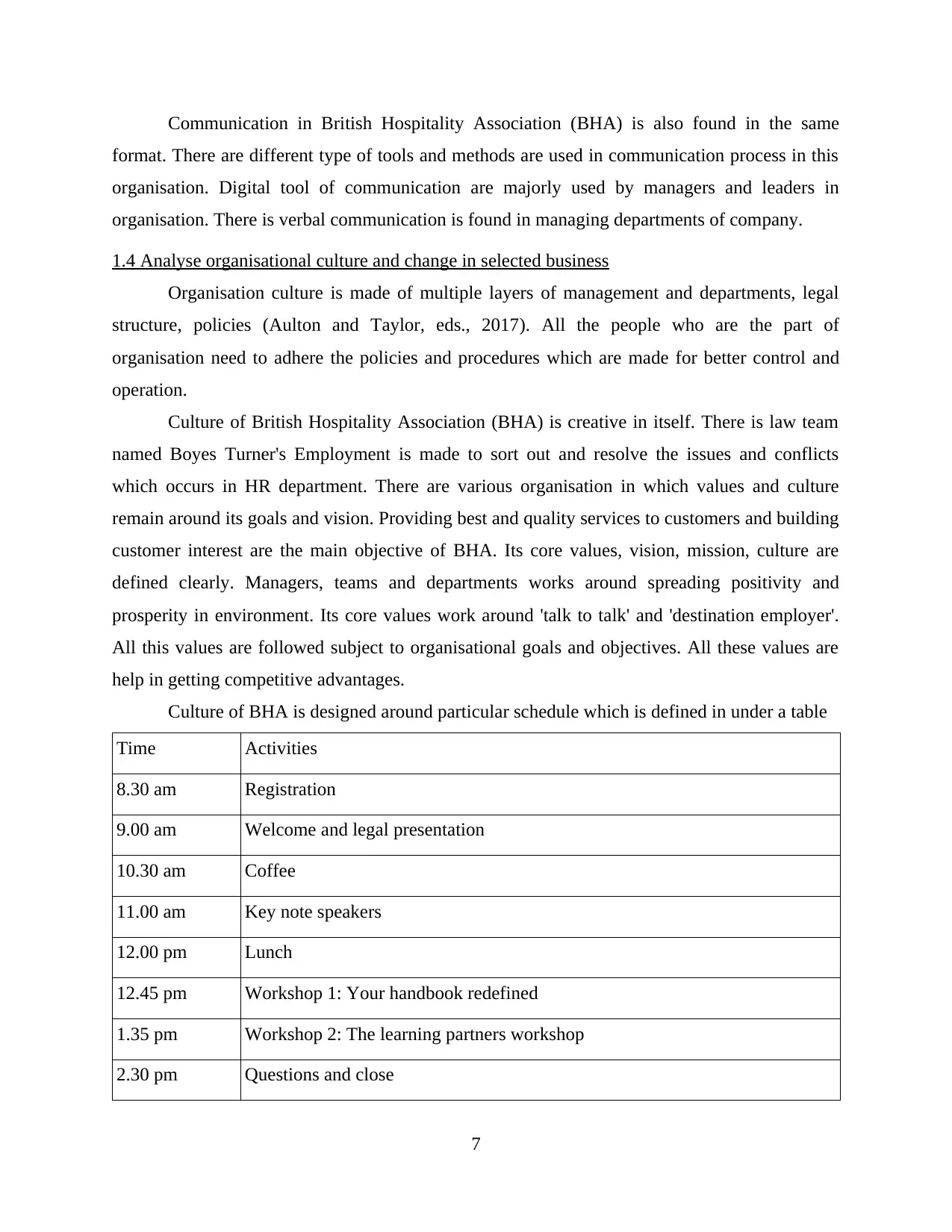
Communication in British Hospitality Association (BHA) is also found in the same
format. There are different type of tools and methods are used in communication process in this
organisation. Digital tool of communication are majorly used by managers and leaders in
organisation. There is verbal communication is found in managing departments of company.
1.4 Analyse organisational culture and change in selected business
Organisation culture is made of multiple layers of management and departments, legal
structure, policies (Aulton and Taylor, eds., 2017). All the people who are the part of
organisation need to adhere the policies and procedures which are made for better control and
operation.
Culture of British Hospitality Association (BHA) is creative in itself. There is law team
named Boyes Turner's Employment is made to sort out and resolve the issues and conflicts
which occurs in HR department. There are various organisation in which values and culture
remain around its goals and vision. Providing best and quality services to customers and building
customer interest are the main objective of BHA. Its core values, vision, mission, culture are
defined clearly. Managers, teams and departments works around spreading positivity and
prosperity in environment. Its core values work around 'talk to talk' and 'destination employer'.
All this values are followed subject to organisational goals and objectives. All these values are
help in getting competitive advantages.
Culture of BHA is designed around particular schedule which is defined in under a table
Time Activities
8.30 am Registration
9.00 am Welcome and legal presentation
10.30 am Coffee
11.00 am Key note speakers
12.00 pm Lunch
12.45 pm Workshop 1: Your handbook redefined
1.35 pm Workshop 2: The learning partners workshop
2.30 pm Questions and close
7
format. There are different type of tools and methods are used in communication process in this
organisation. Digital tool of communication are majorly used by managers and leaders in
organisation. There is verbal communication is found in managing departments of company.
1.4 Analyse organisational culture and change in selected business
Organisation culture is made of multiple layers of management and departments, legal
structure, policies (Aulton and Taylor, eds., 2017). All the people who are the part of
organisation need to adhere the policies and procedures which are made for better control and
operation.
Culture of British Hospitality Association (BHA) is creative in itself. There is law team
named Boyes Turner's Employment is made to sort out and resolve the issues and conflicts
which occurs in HR department. There are various organisation in which values and culture
remain around its goals and vision. Providing best and quality services to customers and building
customer interest are the main objective of BHA. Its core values, vision, mission, culture are
defined clearly. Managers, teams and departments works around spreading positivity and
prosperity in environment. Its core values work around 'talk to talk' and 'destination employer'.
All this values are followed subject to organisational goals and objectives. All these values are
help in getting competitive advantages.
Culture of BHA is designed around particular schedule which is defined in under a table
Time Activities
8.30 am Registration
9.00 am Welcome and legal presentation
10.30 am Coffee
11.00 am Key note speakers
12.00 pm Lunch
12.45 pm Workshop 1: Your handbook redefined
1.35 pm Workshop 2: The learning partners workshop
2.30 pm Questions and close
7
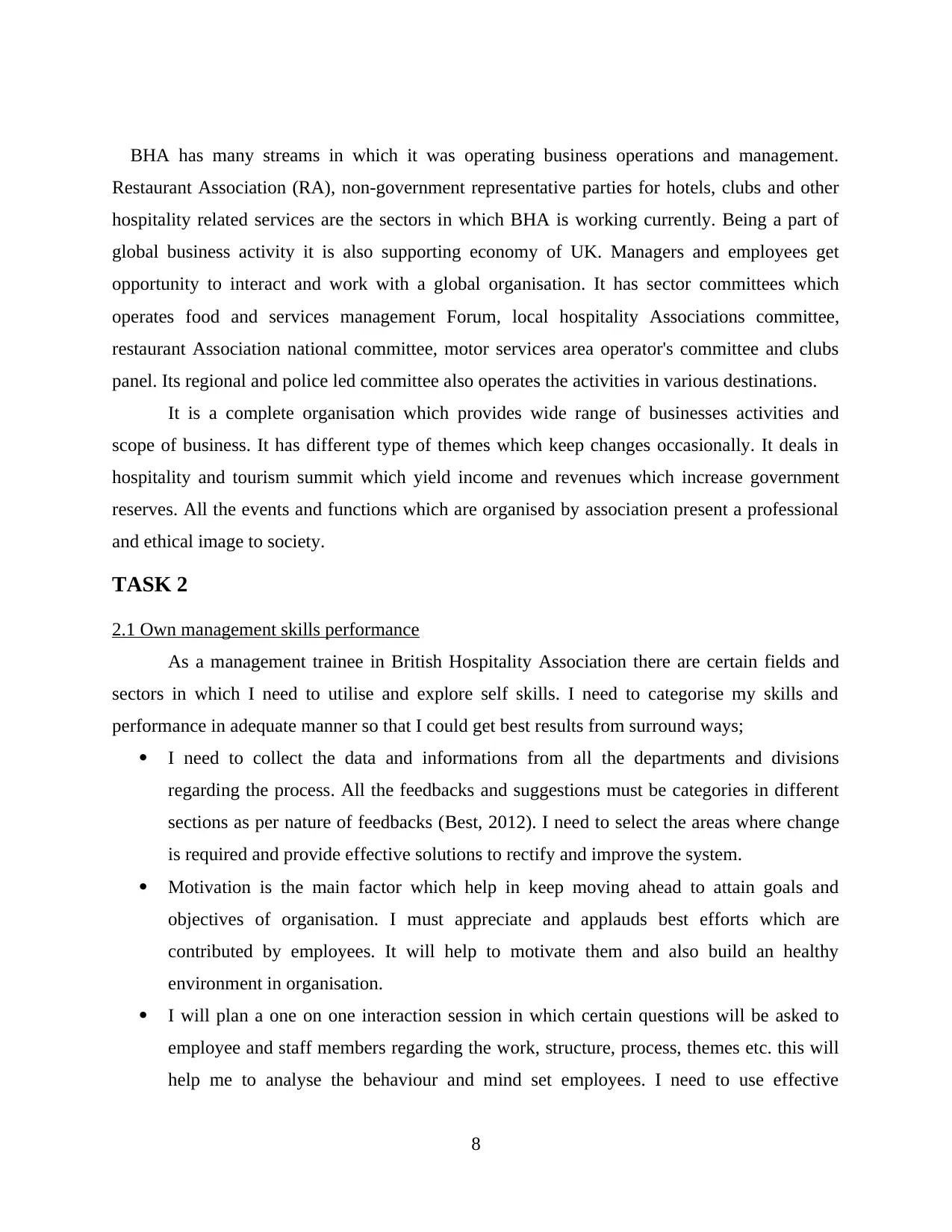
BHA has many streams in which it was operating business operations and management.
Restaurant Association (RA), non-government representative parties for hotels, clubs and other
hospitality related services are the sectors in which BHA is working currently. Being a part of
global business activity it is also supporting economy of UK. Managers and employees get
opportunity to interact and work with a global organisation. It has sector committees which
operates food and services management Forum, local hospitality Associations committee,
restaurant Association national committee, motor services area operator's committee and clubs
panel. Its regional and police led committee also operates the activities in various destinations.
It is a complete organisation which provides wide range of businesses activities and
scope of business. It has different type of themes which keep changes occasionally. It deals in
hospitality and tourism summit which yield income and revenues which increase government
reserves. All the events and functions which are organised by association present a professional
and ethical image to society.
TASK 2
2.1 Own management skills performance
As a management trainee in British Hospitality Association there are certain fields and
sectors in which I need to utilise and explore self skills. I need to categorise my skills and
performance in adequate manner so that I could get best results from surround ways;
I need to collect the data and informations from all the departments and divisions
regarding the process. All the feedbacks and suggestions must be categories in different
sections as per nature of feedbacks (Best, 2012). I need to select the areas where change
is required and provide effective solutions to rectify and improve the system.
Motivation is the main factor which help in keep moving ahead to attain goals and
objectives of organisation. I must appreciate and applauds best efforts which are
contributed by employees. It will help to motivate them and also build an healthy
environment in organisation.
I will plan a one on one interaction session in which certain questions will be asked to
employee and staff members regarding the work, structure, process, themes etc. this will
help me to analyse the behaviour and mind set employees. I need to use effective
8
Restaurant Association (RA), non-government representative parties for hotels, clubs and other
hospitality related services are the sectors in which BHA is working currently. Being a part of
global business activity it is also supporting economy of UK. Managers and employees get
opportunity to interact and work with a global organisation. It has sector committees which
operates food and services management Forum, local hospitality Associations committee,
restaurant Association national committee, motor services area operator's committee and clubs
panel. Its regional and police led committee also operates the activities in various destinations.
It is a complete organisation which provides wide range of businesses activities and
scope of business. It has different type of themes which keep changes occasionally. It deals in
hospitality and tourism summit which yield income and revenues which increase government
reserves. All the events and functions which are organised by association present a professional
and ethical image to society.
TASK 2
2.1 Own management skills performance
As a management trainee in British Hospitality Association there are certain fields and
sectors in which I need to utilise and explore self skills. I need to categorise my skills and
performance in adequate manner so that I could get best results from surround ways;
I need to collect the data and informations from all the departments and divisions
regarding the process. All the feedbacks and suggestions must be categories in different
sections as per nature of feedbacks (Best, 2012). I need to select the areas where change
is required and provide effective solutions to rectify and improve the system.
Motivation is the main factor which help in keep moving ahead to attain goals and
objectives of organisation. I must appreciate and applauds best efforts which are
contributed by employees. It will help to motivate them and also build an healthy
environment in organisation.
I will plan a one on one interaction session in which certain questions will be asked to
employee and staff members regarding the work, structure, process, themes etc. this will
help me to analyse the behaviour and mind set employees. I need to use effective
8
⊘ This is a preview!⊘
Do you want full access?
Subscribe today to unlock all pages.

Trusted by 1+ million students worldwide
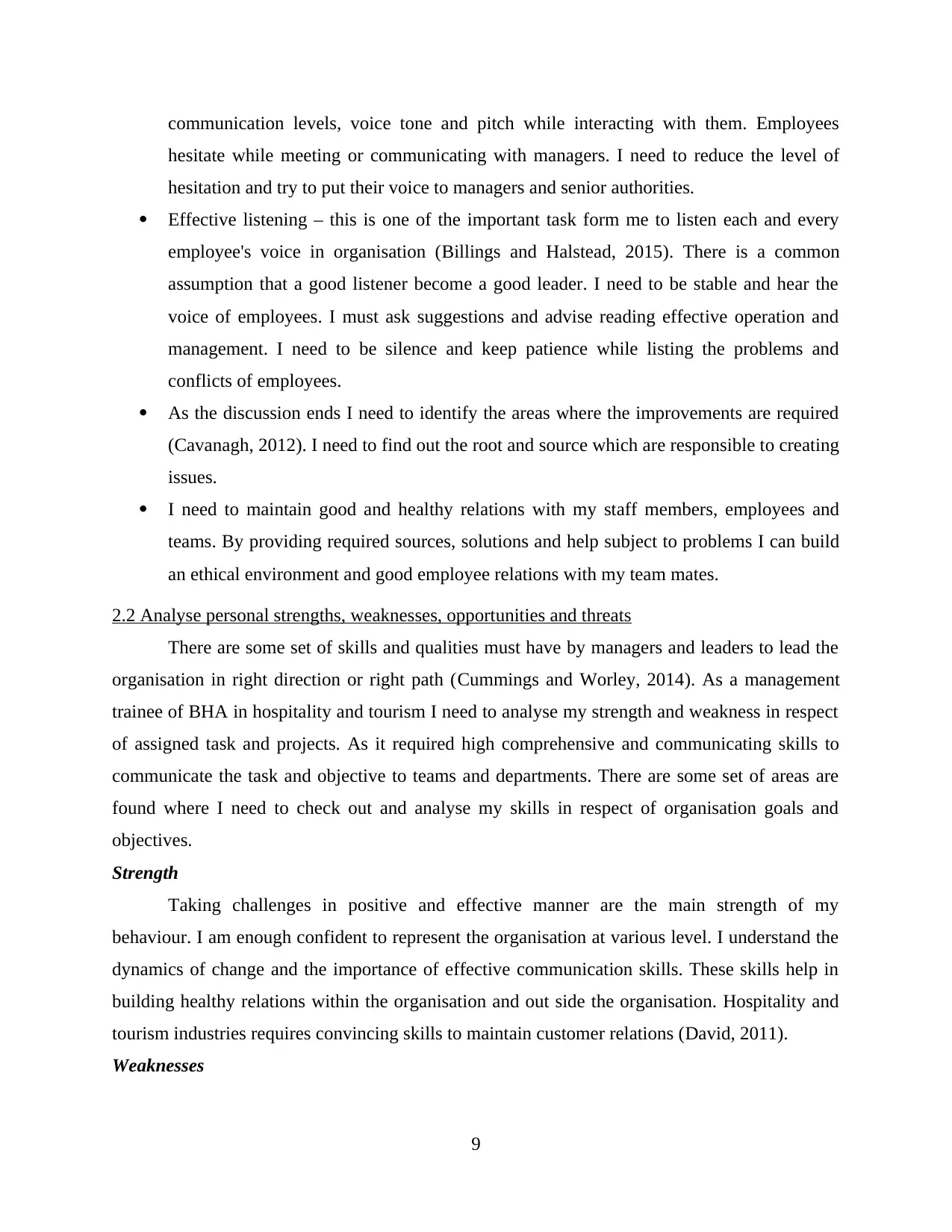
communication levels, voice tone and pitch while interacting with them. Employees
hesitate while meeting or communicating with managers. I need to reduce the level of
hesitation and try to put their voice to managers and senior authorities.
Effective listening – this is one of the important task form me to listen each and every
employee's voice in organisation (Billings and Halstead, 2015). There is a common
assumption that a good listener become a good leader. I need to be stable and hear the
voice of employees. I must ask suggestions and advise reading effective operation and
management. I need to be silence and keep patience while listing the problems and
conflicts of employees.
As the discussion ends I need to identify the areas where the improvements are required
(Cavanagh, 2012). I need to find out the root and source which are responsible to creating
issues.
I need to maintain good and healthy relations with my staff members, employees and
teams. By providing required sources, solutions and help subject to problems I can build
an ethical environment and good employee relations with my team mates.
2.2 Analyse personal strengths, weaknesses, opportunities and threats
There are some set of skills and qualities must have by managers and leaders to lead the
organisation in right direction or right path (Cummings and Worley, 2014). As a management
trainee of BHA in hospitality and tourism I need to analyse my strength and weakness in respect
of assigned task and projects. As it required high comprehensive and communicating skills to
communicate the task and objective to teams and departments. There are some set of areas are
found where I need to check out and analyse my skills in respect of organisation goals and
objectives.
Strength
Taking challenges in positive and effective manner are the main strength of my
behaviour. I am enough confident to represent the organisation at various level. I understand the
dynamics of change and the importance of effective communication skills. These skills help in
building healthy relations within the organisation and out side the organisation. Hospitality and
tourism industries requires convincing skills to maintain customer relations (David, 2011).
Weaknesses
9
hesitate while meeting or communicating with managers. I need to reduce the level of
hesitation and try to put their voice to managers and senior authorities.
Effective listening – this is one of the important task form me to listen each and every
employee's voice in organisation (Billings and Halstead, 2015). There is a common
assumption that a good listener become a good leader. I need to be stable and hear the
voice of employees. I must ask suggestions and advise reading effective operation and
management. I need to be silence and keep patience while listing the problems and
conflicts of employees.
As the discussion ends I need to identify the areas where the improvements are required
(Cavanagh, 2012). I need to find out the root and source which are responsible to creating
issues.
I need to maintain good and healthy relations with my staff members, employees and
teams. By providing required sources, solutions and help subject to problems I can build
an ethical environment and good employee relations with my team mates.
2.2 Analyse personal strengths, weaknesses, opportunities and threats
There are some set of skills and qualities must have by managers and leaders to lead the
organisation in right direction or right path (Cummings and Worley, 2014). As a management
trainee of BHA in hospitality and tourism I need to analyse my strength and weakness in respect
of assigned task and projects. As it required high comprehensive and communicating skills to
communicate the task and objective to teams and departments. There are some set of areas are
found where I need to check out and analyse my skills in respect of organisation goals and
objectives.
Strength
Taking challenges in positive and effective manner are the main strength of my
behaviour. I am enough confident to represent the organisation at various level. I understand the
dynamics of change and the importance of effective communication skills. These skills help in
building healthy relations within the organisation and out side the organisation. Hospitality and
tourism industries requires convincing skills to maintain customer relations (David, 2011).
Weaknesses
9
Paraphrase This Document
Need a fresh take? Get an instant paraphrase of this document with our AI Paraphraser
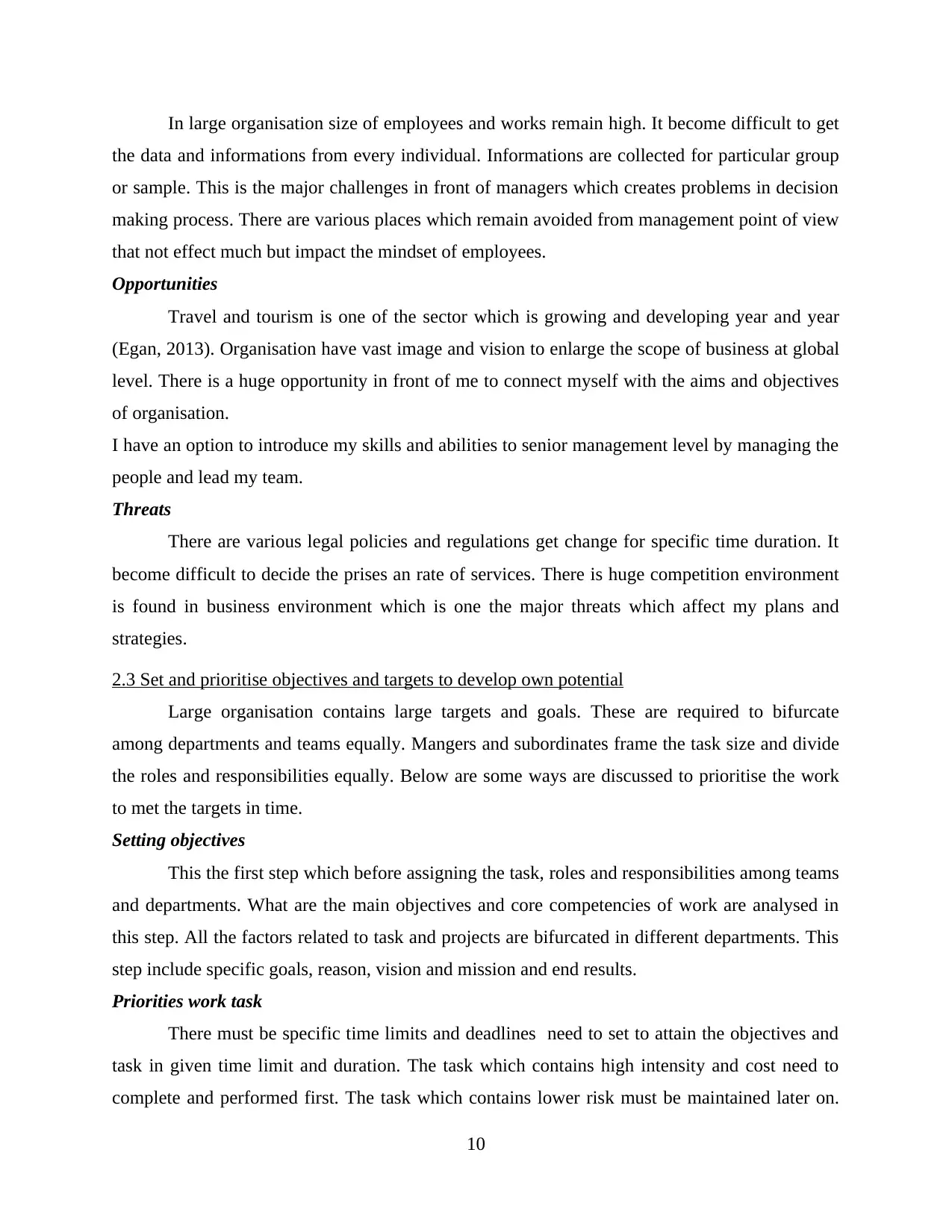
In large organisation size of employees and works remain high. It become difficult to get
the data and informations from every individual. Informations are collected for particular group
or sample. This is the major challenges in front of managers which creates problems in decision
making process. There are various places which remain avoided from management point of view
that not effect much but impact the mindset of employees.
Opportunities
Travel and tourism is one of the sector which is growing and developing year and year
(Egan, 2013). Organisation have vast image and vision to enlarge the scope of business at global
level. There is a huge opportunity in front of me to connect myself with the aims and objectives
of organisation.
I have an option to introduce my skills and abilities to senior management level by managing the
people and lead my team.
Threats
There are various legal policies and regulations get change for specific time duration. It
become difficult to decide the prises an rate of services. There is huge competition environment
is found in business environment which is one the major threats which affect my plans and
strategies.
2.3 Set and prioritise objectives and targets to develop own potential
Large organisation contains large targets and goals. These are required to bifurcate
among departments and teams equally. Mangers and subordinates frame the task size and divide
the roles and responsibilities equally. Below are some ways are discussed to prioritise the work
to met the targets in time.
Setting objectives
This the first step which before assigning the task, roles and responsibilities among teams
and departments. What are the main objectives and core competencies of work are analysed in
this step. All the factors related to task and projects are bifurcated in different departments. This
step include specific goals, reason, vision and mission and end results.
Priorities work task
There must be specific time limits and deadlines need to set to attain the objectives and
task in given time limit and duration. The task which contains high intensity and cost need to
complete and performed first. The task which contains lower risk must be maintained later on.
10
the data and informations from every individual. Informations are collected for particular group
or sample. This is the major challenges in front of managers which creates problems in decision
making process. There are various places which remain avoided from management point of view
that not effect much but impact the mindset of employees.
Opportunities
Travel and tourism is one of the sector which is growing and developing year and year
(Egan, 2013). Organisation have vast image and vision to enlarge the scope of business at global
level. There is a huge opportunity in front of me to connect myself with the aims and objectives
of organisation.
I have an option to introduce my skills and abilities to senior management level by managing the
people and lead my team.
Threats
There are various legal policies and regulations get change for specific time duration. It
become difficult to decide the prises an rate of services. There is huge competition environment
is found in business environment which is one the major threats which affect my plans and
strategies.
2.3 Set and prioritise objectives and targets to develop own potential
Large organisation contains large targets and goals. These are required to bifurcate
among departments and teams equally. Mangers and subordinates frame the task size and divide
the roles and responsibilities equally. Below are some ways are discussed to prioritise the work
to met the targets in time.
Setting objectives
This the first step which before assigning the task, roles and responsibilities among teams
and departments. What are the main objectives and core competencies of work are analysed in
this step. All the factors related to task and projects are bifurcated in different departments. This
step include specific goals, reason, vision and mission and end results.
Priorities work task
There must be specific time limits and deadlines need to set to attain the objectives and
task in given time limit and duration. The task which contains high intensity and cost need to
complete and performed first. The task which contains lower risk must be maintained later on.
10
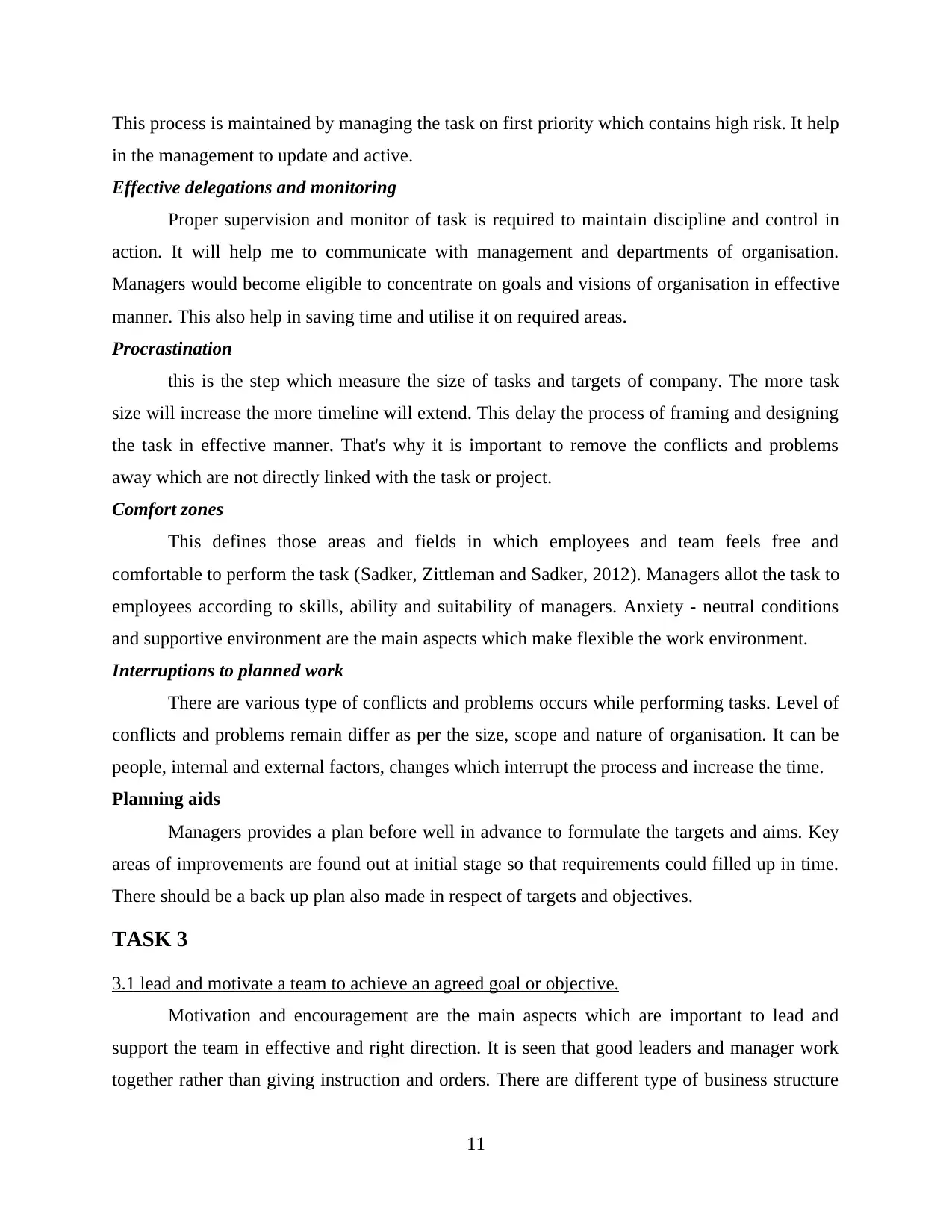
This process is maintained by managing the task on first priority which contains high risk. It help
in the management to update and active.
Effective delegations and monitoring
Proper supervision and monitor of task is required to maintain discipline and control in
action. It will help me to communicate with management and departments of organisation.
Managers would become eligible to concentrate on goals and visions of organisation in effective
manner. This also help in saving time and utilise it on required areas.
Procrastination
this is the step which measure the size of tasks and targets of company. The more task
size will increase the more timeline will extend. This delay the process of framing and designing
the task in effective manner. That's why it is important to remove the conflicts and problems
away which are not directly linked with the task or project.
Comfort zones
This defines those areas and fields in which employees and team feels free and
comfortable to perform the task (Sadker, Zittleman and Sadker, 2012). Managers allot the task to
employees according to skills, ability and suitability of managers. Anxiety - neutral conditions
and supportive environment are the main aspects which make flexible the work environment.
Interruptions to planned work
There are various type of conflicts and problems occurs while performing tasks. Level of
conflicts and problems remain differ as per the size, scope and nature of organisation. It can be
people, internal and external factors, changes which interrupt the process and increase the time.
Planning aids
Managers provides a plan before well in advance to formulate the targets and aims. Key
areas of improvements are found out at initial stage so that requirements could filled up in time.
There should be a back up plan also made in respect of targets and objectives.
TASK 3
3.1 lead and motivate a team to achieve an agreed goal or objective.
Motivation and encouragement are the main aspects which are important to lead and
support the team in effective and right direction. It is seen that good leaders and manager work
together rather than giving instruction and orders. There are different type of business structure
11
in the management to update and active.
Effective delegations and monitoring
Proper supervision and monitor of task is required to maintain discipline and control in
action. It will help me to communicate with management and departments of organisation.
Managers would become eligible to concentrate on goals and visions of organisation in effective
manner. This also help in saving time and utilise it on required areas.
Procrastination
this is the step which measure the size of tasks and targets of company. The more task
size will increase the more timeline will extend. This delay the process of framing and designing
the task in effective manner. That's why it is important to remove the conflicts and problems
away which are not directly linked with the task or project.
Comfort zones
This defines those areas and fields in which employees and team feels free and
comfortable to perform the task (Sadker, Zittleman and Sadker, 2012). Managers allot the task to
employees according to skills, ability and suitability of managers. Anxiety - neutral conditions
and supportive environment are the main aspects which make flexible the work environment.
Interruptions to planned work
There are various type of conflicts and problems occurs while performing tasks. Level of
conflicts and problems remain differ as per the size, scope and nature of organisation. It can be
people, internal and external factors, changes which interrupt the process and increase the time.
Planning aids
Managers provides a plan before well in advance to formulate the targets and aims. Key
areas of improvements are found out at initial stage so that requirements could filled up in time.
There should be a back up plan also made in respect of targets and objectives.
TASK 3
3.1 lead and motivate a team to achieve an agreed goal or objective.
Motivation and encouragement are the main aspects which are important to lead and
support the team in effective and right direction. It is seen that good leaders and manager work
together rather than giving instruction and orders. There are different type of business structure
11
⊘ This is a preview!⊘
Do you want full access?
Subscribe today to unlock all pages.

Trusted by 1+ million students worldwide
1 out of 18
Related Documents
Your All-in-One AI-Powered Toolkit for Academic Success.
+13062052269
info@desklib.com
Available 24*7 on WhatsApp / Email
![[object Object]](/_next/static/media/star-bottom.7253800d.svg)
Unlock your academic potential
Copyright © 2020–2026 A2Z Services. All Rights Reserved. Developed and managed by ZUCOL.




